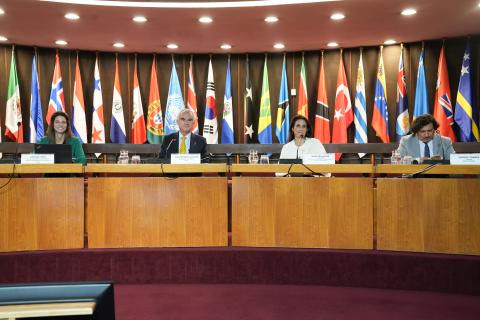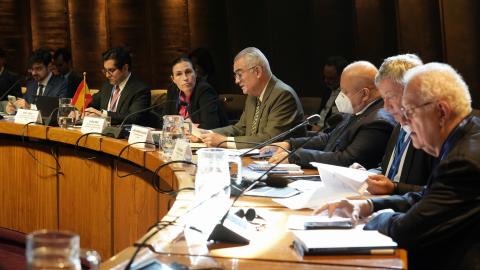Press Release
After five days of debates and of exchanging experiences, the Cities Conference held at ECLAC’s headquarters in Santiago, Chile concluded on Friday, October 6 with a call for dialogue among public and private stakeholders on the implementation of safe, affordable and sustainable urban mobility in Latin America and the Caribbean.
On the last day of the gathering – co-organized by the Economic Commission for Latin America and the Caribbean (ECLAC), the Assembly of Ministers and High Authorities of Housing and Urban Development of Latin America and the Caribbean (MINURVI), and UN-Habitat – authorities and experts presented good practices and local public policy recommendations for strengthening sustainable mobility in the region’s cities during a seminar on this topic. The seminar was convened by ECLAC with the support of the World Bank, the Inter-American Development Bank (IDB), the CAF–Development Bank of Latin America, German cooperation (BMZ-GIZ) and the Partnership for Sustainable Carbon Transport (SloCaT).
The event drew prominent international specialists who addressed how the Regional Action Plan for implementation of the New Urban Agenda (NUA) in Latin America and the Caribbean – presented this week at the conference – can be articulated with the 2030 Agenda and its Sustainable Development Goals (SDGs), the Paris Agreement, and other global accords.
In that framework, participants debated the next steps to be taken toward establishing a regional action agenda for urban mobility.
“We have discussed what we can do to better connect development banks and other cooperation initiatives with the needs of the region’s countries and cities in terms of transportation policies, to improve them and align them with different global agreements and the Regional Action Plan in particular,” said Carlos Felipe Pardo, Executive Director of a Colombian organization called Despacio, who acted as one of the event’s moderators.
During the meeting’s closing session, Joseluis Samaniego, Director of ECLAC’s Sustainable Development and Human Settlements Division, highlighted the progress made during this week and stressed the benefit of holding these kinds of gatherings in a stable and periodic fashion, to move forward on coordinating issues of transportation, mobility and cities with the NUA and other global initiatives.
“We don’t think about the region as a whole in terms of infrastructure, or resilience, or forests, for example, because we don’t have the proper forums for this. The same thing happens with the issue of transportation. I wish we had a stable space for analyzing progress, policies and alliances,” Samaniego emphasized.
He also referred to the political importance of these issues. “This is part of the democratic commitment: public space and public services affect all citizens … we must analyze who occupies these spaces, who has the rights to the surface and to what’s underneath, how we distribute the streets based on modal needs. This is a discussion that has a political and civic backdrop that should be reviewed periodically,” he said.
During the Cities Conference held at ECLAC, a Public-Private Dialogue for Promoting Urban Sustainability in Latin America and the Caribbean also took place, in which participants addressed the contribution of public-private partnerships to the development of more inclusive cities, with more equitable access to urban services and to new sources of data.
The Conference, which was held nearly one year after the Habitat III Conference in Quito, brought together national and subnational actors, representatives of academia and civil society, development banks, the private sector and international agencies. It served as a strategic platform for dialogue on the NUA’s implementation in Latin America and the Caribbean and on contributing to achievement of the SDGs.



